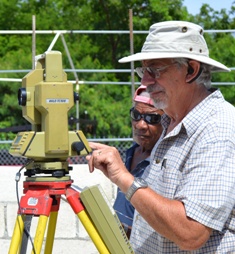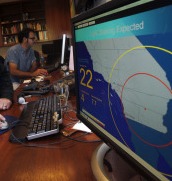 Technology
Technology

Search engines failing, says Facebook exec
 (Telegraph): Top Facebook executive, Ethan Beard, has said that Google and other search engines are failing to give people the results they really want and need. Talking exclusively to The Telegraph, Beard, the director of the Facebook Platform, said that search will have to “go social” but admitted that a tie-up between the social network and its major rival Google would not make good business sense, despite the benefits to consumers. Beard is in London, as part of a global tour, talking to hundreds of British developers about the new additions to the site’s Platform since f8, the recent Facebook developers conference – at which the site's chief, Mark Zuckerberg, announced the 'Timeline' and a ‘new breed of social apps’.
(Telegraph): Top Facebook executive, Ethan Beard, has said that Google and other search engines are failing to give people the results they really want and need. Talking exclusively to The Telegraph, Beard, the director of the Facebook Platform, said that search will have to “go social” but admitted that a tie-up between the social network and its major rival Google would not make good business sense, despite the benefits to consumers. Beard is in London, as part of a global tour, talking to hundreds of British developers about the new additions to the site’s Platform since f8, the recent Facebook developers conference – at which the site's chief, Mark Zuckerberg, announced the 'Timeline' and a ‘new breed of social apps’.
‘Platform’ is the part of Facebook which allows other websites to integrate Facebook apps or tools, such as the Like button, onto their website, and developers to use the site’s social graph to create socially driven services and games, such as the hugely popular Farmville game.
Beard said that search needed to go social so that people could get really good product recommendations from their most trusted sources, their friends, as well links to sites where they can buy the items.

Salt could increase data storage six fold
 (Times of India): Scientists in Singapore have discovered a process that can expand the data storage capacity of computer hard disks six-fold using a common kitchen ingredient — table salt. The discovery was made by Singapore's national research institute the Agency for Science, Technology and Research, in collaboration with the National University of Singapore and the Data Storage Institute. The institutions have "developed a process that can increase the data recording density of hard disks to 3.3 Terabits per square inch, six times the recording density of current models", they said in a statement.
(Times of India): Scientists in Singapore have discovered a process that can expand the data storage capacity of computer hard disks six-fold using a common kitchen ingredient — table salt. The discovery was made by Singapore's national research institute the Agency for Science, Technology and Research, in collaboration with the National University of Singapore and the Data Storage Institute. The institutions have "developed a process that can increase the data recording density of hard disks to 3.3 Terabits per square inch, six times the recording density of current models", they said in a statement.
"This means that a hard disk drive that holds 1 Terabyte (TB) of data today could, in the future, hold 6 TB of information in the same size using this new technology."

Expert points telescope in right direction
 (CNS): The UCCI’s goal to open an observatory on the campus has taken another important step forward after an expert local land surveyor defined a True North – South line on the concrete slab where the telescope will sit, recently. Chris Evans, of Evans & Associates, Licensed Land Surveyors, who admits to having an interest in the subject donated his time recently to establish this important fact at the start of construction of the “Reach for the Stars” project which gets underway this month. One half of the building will be a classroom and the other will house a 12.5" fully computerized reflector telescope and in order for it to operate correctly it has to be accurately orientated.
(CNS): The UCCI’s goal to open an observatory on the campus has taken another important step forward after an expert local land surveyor defined a True North – South line on the concrete slab where the telescope will sit, recently. Chris Evans, of Evans & Associates, Licensed Land Surveyors, who admits to having an interest in the subject donated his time recently to establish this important fact at the start of construction of the “Reach for the Stars” project which gets underway this month. One half of the building will be a classroom and the other will house a 12.5" fully computerized reflector telescope and in order for it to operate correctly it has to be accurately orientated.
“I have always been interested in astronomy and hand-ground a telescope mirror when I was a teenager,” Evans said. I was therefore very happy to donate our services tothis interesting and important project. I look forward to visiting the observatory when it is completed.”

Violent video games ‘reduce crime’
 (The Telegraph): Violent video games may actually reduce crime as aggressive players are "too busy" shooting virtual enemies to cause trouble in the real world, experts claim. Games such as Manhunt and Grand Theft Auto – where gamers rack up points or cash for killing or savagely attacking victims – are routinely blamed for a rise in violent crime. A spate of high profile murder cases have heard evidence that various games were 'to blame' for a string of killings. But a report, called 'Understanding the Effects of Violent Video Games on Violent Crime' by three respected academics has said it doesn't believe there is a link. The report argues that gamers are 'too busy' playing to cause much trouble in the real world.
(The Telegraph): Violent video games may actually reduce crime as aggressive players are "too busy" shooting virtual enemies to cause trouble in the real world, experts claim. Games such as Manhunt and Grand Theft Auto – where gamers rack up points or cash for killing or savagely attacking victims – are routinely blamed for a rise in violent crime. A spate of high profile murder cases have heard evidence that various games were 'to blame' for a string of killings. But a report, called 'Understanding the Effects of Violent Video Games on Violent Crime' by three respected academics has said it doesn't believe there is a link. The report argues that gamers are 'too busy' playing to cause much trouble in the real world.

Google helps put Dead Sea Scrolls online
 (BBC): Ultra-high resolution images of several Dead Sea Scrolls are now available on the web, after Google helped digitise the ancient texts. The search firm lent its expertise in scanning documents to the Israel Museum in Jerusalem. Both amateur and professional scholars will now have access to 1,200 megapixel images. Five scrolls have been captured, including the Temple Scroll and Great Isaiah Scroll. Ardon Bar-Hama, a noted photographer of antiquities, used ultraviolet-protected flash tubes to light the scrolls for 1/4000th of a second. The Dead Sea Scrolls were discovered between 1947 and 1956 inside 11 caves along the shore of the Dead Sea, East of Jerusalem.
(BBC): Ultra-high resolution images of several Dead Sea Scrolls are now available on the web, after Google helped digitise the ancient texts. The search firm lent its expertise in scanning documents to the Israel Museum in Jerusalem. Both amateur and professional scholars will now have access to 1,200 megapixel images. Five scrolls have been captured, including the Temple Scroll and Great Isaiah Scroll. Ardon Bar-Hama, a noted photographer of antiquities, used ultraviolet-protected flash tubes to light the scrolls for 1/4000th of a second. The Dead Sea Scrolls were discovered between 1947 and 1956 inside 11 caves along the shore of the Dead Sea, East of Jerusalem.

US scientists testing earthquake early warning
 (CBS): Elizabeth Cochran was sitting in her office when her computer suddenly sounded an alarm. A map of California on her screen lit up with a red dot, signaling an earthquake had struck. A clock next to the map counted down the seconds until shock waves fanning out from the epicenter north of Los Angeles reached her location in Pasadena. Right on cue, Cochran felt her chair quiver ever so slightly from a magnitude-4.2 that rumbled through. "If I hadn't known it was an earthquake, I would have thought it was a truck going by," she said. After years of lagging behind Japan, Mexico and other quake-prone countries, the US government has been quietly testing an earthquake early warning system in California since February.
(CBS): Elizabeth Cochran was sitting in her office when her computer suddenly sounded an alarm. A map of California on her screen lit up with a red dot, signaling an earthquake had struck. A clock next to the map counted down the seconds until shock waves fanning out from the epicenter north of Los Angeles reached her location in Pasadena. Right on cue, Cochran felt her chair quiver ever so slightly from a magnitude-4.2 that rumbled through. "If I hadn't known it was an earthquake, I would have thought it was a truck going by," she said. After years of lagging behind Japan, Mexico and other quake-prone countries, the US government has been quietly testing an earthquake early warning system in California since February.
Cochran belongs to an exclusive club of scientists who receive a heads up every time the state shakes. The alert system is still crude and messages are not yet broadcast to residents or businesses.
With more testing and funding, researchers hope to build a public warning system similar to the Japanese that has been credited with saving lives during the March 11 magnitude-9 disaster.
Since earthquakes are unpredictable, supporters of early warning say it's the next best thing to prepare people and the commercial sector before the ground rocks. Even a 5-second advance notice can be precious, they contend.

Facebook adds follow option with ‘Subscribe’
 (PC Magazine): Facebook on Wednesday unveiled the "Subscribe" button, which will allow you to subscribe to, or follow, people and read their public posts. The site also rolled out new options for how much information shows up in your news feed. The Subscribe button is intended to connect you with "interesting people you're not friends with—like journalists, artists and political figures," Blake Ross, director of product at Facebook, wrote in a blog post. If you see a Subscribe button on someone's profile, click it to receive updates from that person in your feed. You won't be "friends" with them or see private posts, but if they make something public, like a link to an article or new project, it'll show up in your feed.
(PC Magazine): Facebook on Wednesday unveiled the "Subscribe" button, which will allow you to subscribe to, or follow, people and read their public posts. The site also rolled out new options for how much information shows up in your news feed. The Subscribe button is intended to connect you with "interesting people you're not friends with—like journalists, artists and political figures," Blake Ross, director of product at Facebook, wrote in a blog post. If you see a Subscribe button on someone's profile, click it to receive updates from that person in your feed. You won't be "friends" with them or see private posts, but if they make something public, like a link to an article or new project, it'll show up in your feed.

In case you wondered, a real human wrote this column
 (New York Times): “Wisconsin appears to be in the driver’s seat en route to a win, as it leads 51-10 after the third quarter. Wisconsin added to its lead when Russell Wilson found Jacob Pedersen for an eight-yard touchdown to make the score 44-3 … . ” Those words began a news brief written within 60 seconds of the end of the third quarter of the Wisconsin-U.N.L.V. football game earlier this month. They may not seem like much — but they were written by a computer. The clever code is the handiwork of Narrative Science, a start-up in Evanston, Ill., that offers proof of the progress of artificial intelligence — the ability of computers to mimic human reasoning.
(New York Times): “Wisconsin appears to be in the driver’s seat en route to a win, as it leads 51-10 after the third quarter. Wisconsin added to its lead when Russell Wilson found Jacob Pedersen for an eight-yard touchdown to make the score 44-3 … . ” Those words began a news brief written within 60 seconds of the end of the third quarter of the Wisconsin-U.N.L.V. football game earlier this month. They may not seem like much — but they were written by a computer. The clever code is the handiwork of Narrative Science, a start-up in Evanston, Ill., that offers proof of the progress of artificial intelligence — the ability of computers to mimic human reasoning.
The company’s software takes data, like that from sports statistics, company financial reports and housing starts and sales, and turns it into articles.

Sex domain registration begins
 (BBC): Companies and celebrities are being given the chance to protect their names from porn hijacking ahead of the launch of the .xxx web domain. From today, brands can request to have their name blocked from use with the new suffix, which goes live next year. Existing adult entertainment sites can also submit their application to reserve a spot on .xxx. The "red light" suffix is intended to make it easier to find or avoid sexually explicit material online. ICM Registry, which is administering the launch, said it hoped to "promote a responsible approach to adult content". Brand and IP holders wanting to register now have 50 days – a so-called "sunrise period" – to submit their application.
(BBC): Companies and celebrities are being given the chance to protect their names from porn hijacking ahead of the launch of the .xxx web domain. From today, brands can request to have their name blocked from use with the new suffix, which goes live next year. Existing adult entertainment sites can also submit their application to reserve a spot on .xxx. The "red light" suffix is intended to make it easier to find or avoid sexually explicit material online. ICM Registry, which is administering the launch, said it hoped to "promote a responsible approach to adult content". Brand and IP holders wanting to register now have 50 days – a so-called "sunrise period" – to submit their application.
Companies and individualsthat do not want their name associated with pornography will be able to pay a one-off fee of between $150 and $300 (£100 to £200), depending on which company they register their domain with.

Oprah to do Q&A on Facebook live-webcast
 (LinkedIn): Oprah Winfrey is coming to Facebook next week. On September 8, the TV star will be the one answering questions rather than asking them, appearing on a one-hour Facebook Live streaming video interview on Sept. 8 at 4:30 P.M. Eastern Time, 1:30 P.M. Pacific. To see the live webcast, go to Facebook Live on Sept. 8 and Oprah will answer questions shared by visitors to the Facebook Live event wall. Fans are invited to share their questions now, with the promise that “you might hear Oprah answer your question during the live show.” Oprah is no stranger to Facebook. Her official Oprah Winfrey page is liked by more than 6.2 million fans.
(LinkedIn): Oprah Winfrey is coming to Facebook next week. On September 8, the TV star will be the one answering questions rather than asking them, appearing on a one-hour Facebook Live streaming video interview on Sept. 8 at 4:30 P.M. Eastern Time, 1:30 P.M. Pacific. To see the live webcast, go to Facebook Live on Sept. 8 and Oprah will answer questions shared by visitors to the Facebook Live event wall. Fans are invited to share their questions now, with the promise that “you might hear Oprah answer your question during the live show.” Oprah is no stranger to Facebook. Her official Oprah Winfrey page is liked by more than 6.2 million fans.